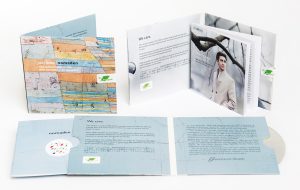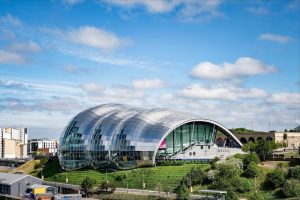From Julie’s bicycle to Lille’s green opera house, from singing Haydn in the middle of plastic waste to an energy-saving Mediterranean park on a Cultural Center roof, from plastic-free CD packaging to a major concert hall’s sustainable priorities… here is inspiration from all over the world.
Julie’s Bicycle: Change culture – and the world
Julie’s Bicycle (JB) is a pioneering London-based non-profit, mobilising the arts and culture to take action on the climate and ecological crisis. Founded by the music industry in 2007, JB has partnered with over 2000 organisations in the UK, the EU and internationally, including Arts Council England, Universal Music, Curzon Cinema Group, Festival Republic, National Theatre, V&A and Somerset House.
Combining cultural and environmental expertise, JB focuses on high-impact programmes and policy-change to meet the climate and ecological crisis head-on. It leads strategic responses, develops resources and networks, and brings unique methods to scale to accelerate movement and transform the conversation.
Advocacy is a vital part of JB’s role. Julie’s Bicycle informs policy development and influences decision makers by advocating for creative, science-based solutions to climate and nature change and presenting robust evidence-based research and data.
To inspire public action, JB provides expert knowledge and guidance through co-created research, tools and events. JB’s Resource Hub is the most comprehensive library of good environmental practice specifically for the arts and culture anywhere in the world, co-created with creative companies and artists. It’s philosophy, simply put: Change culture, and culture will change the world.
By Julie’s Bicycle
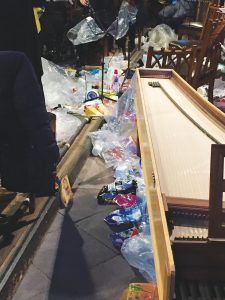
Haydn´s Creation: Sinking into plastic waste
Thimo Neumann, cantor of the protestant lutheran church in Mölln, Northern Germany, staged this major oratorio as a so-called „climate concert“.
For me, this performance of Joseph Haydn’s “Creation” at the St. Nicolai Church was a concert I’m sure the audience and I will remember for a long time. The orchestra was seated in the middle of packaging waste, literally surrounded by plastic rubbish. The music was interspersed with spoken texts about the problems of climate change, and during the interval the congregation’s sustainability group served refreshments in plastic-free containers. I thought to myself: I cannot with a clear conscience perform this wonderful work, which so much praises creation, just as is. With this project I wanted to draw attention deliberately to the way we humans treat this creation! For we are destroying it.
“This is exactly what I wanted to provoke with this: take people out of their comfort zones, force them to confront the topic of climate change.”
The run-up to this concert created many very sharp divisions. I needed to spend a lot of time talking to my choir about my ideas until most singers were convinced (not all!). I received indignant e-mails from people who had read the press release: “The orchestra is playing surrounded by rubbish”. This is exactly the reaction I wanted to provoke: Take people out of their comfort zones, force them to confront the topic of climate change and ask what can each individual do? The concert was very well attended. Above all, I lured people into the church who would otherwise not have come! All in – I’d do exactly the same again!
By Thimo Neumann, Cantor
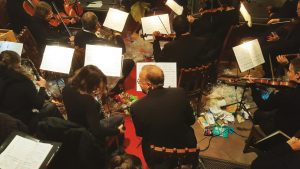
The Stavros Niarchos Foundation Cultural Center: Where art meets nature between city and sea
The SNFCC is a new cultural area situated in Kallithea, Athens, financed by the Stavros Niarchos Foundation and donated to the Greek state in 2017. The area includes the new National Library of Greece and the new Greek National Opera, as well as a beautiful 210,000 m² park open to everyone. This park constitutes the roof of part of the building and has been planted with a rich local flora – olive trees, evergreen shrubs, carob trees, laurels, cypress trees and aromatic plants. Besides creating a leisure area for Athenians of all ages, the vegetation protects the building from the heat, reducing the need for air conditioning.
As water is a scarce resource in this region, the whole system is based on the use of sea water and a rainwater harvesting system, completed by a water cleaning system for all sanitary facilities. The SNFCC abides by a Waste Management Plan with 15 different recycling streams. The plant irrigation system is underground, to avoid evaporation. The canal situated next to the building entrance, one of the most beautiful elements of the area, serves as a reserve of sea water as well as background for open air concerts, light installations and much more.
The part of the building not roofed by the park is optimized to reduce the need for artificial lightning. That section of the roof is a canopy covered with 5,700 solar panels. Depending on the season, SNFCC’s entire energy needs may be supplied by the canopy, minimizing CO2 emissions.
Visitors to SNFCC are encouraged to use bicycles and public transports: an easy system of bike rental service is available; bike activities are offered to the public; and the park is directly connected to the city center thanks to several bus lines.
The Stavros Niarchos Foundation Cultural Center has been awarded several international certifications, including LEED Platinum certification, the first large-scale cultural project to achieve that designation.
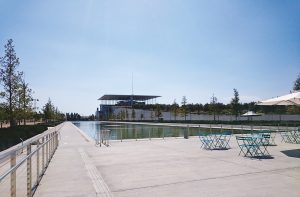
Lille: Green opera
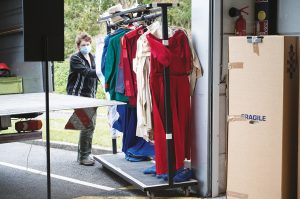
Since 2015, the Opéra de Lille (northern France) has put environmental sustainability high on its list of priorities. All teams and partners of the opera are invited to pursue a common aim: changing the opera’s economic, social and environmental footprints. This work has been distinguished by an ISO certification: the label ISO 20121 guides and attests to the sustainable policy of organisations in the French cultural and events sector. The Opéra de Lille is the first opera house in France to receive this certification. Three pillars underlie the opera’s policy: “Opera for everyone” (pursuing optimum accessibility to the art, from the social, physical and intellectual points of view, etc.), “Employer’s responsibility” (professional equity and diversity, workplace improvement, etc.), and last but not least: “Reduction of the environmental impact” (waste management, green energy, etc.).
…Maybe some of these ideas could be suggested to your local concert hall?
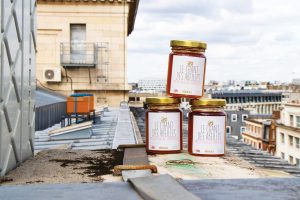
But what do the efforts of a “green” opera look like? Here are some inspiring ideas:
- Donation of stage designs and costumes to regional companies
- Donation of unused office products to student associations
- No food waste through donation to associations
- Minimal packaging and organic food for artists’ catering
- Providing reusable drinking bottles to employees to reduce the use of disposable bottles
- Beehives on the roof of the opera
- Contracts with green energy providers
BIS Sweden: The CD Ecopak
At BIS Records in Sweden, we have long been frustrated by the excess energy wasted on producing physical sound carriers. Plastic CD cases are detrimental to the environment, for the oil used in making the plastic; create a lot of environmentally unsound waste; weigh a lot, which uses up excess fuel during transport; and are highly breakable – just drop a jewel box on the floor and see what happens.
So we decided to do something about it. Having looked at what the market offered, we found that nothing really filled the bill for us, so we created a new product instead, using only fully-certified ecological ingredients. The BIS Ecopak was created, a throwback to the old double LP covers, where a CD in an inner sleeve is put into one opening and the booklet into the other. It is made of 100% reused, certified ecological cardboard, soy colours, eco-glue and water-based varnish. The Ecopak weighs 40% less, takes up less space on the shelf and – but this is obviously a subjective view – is much more beautiful than the corresponding jewel case would have been. It can also withstand outer forces much better than a plastic case. It costs marginally more than the jewel case, but we believe that the environment is worth it.
It is now our fervent hope that the industry will change its habits and adopt this new packaging (as some labels already have done).
By Robert von Bahr, CEO of BIS Records AB
Thessaloniki: A digital World Choir Festival dedicated to Environment
In November 2020, the World Choir Festival on Musical and the “KORAIS” choir organised their first digital World Choir Festival and dedicated it to Peace. More than 72 choirs from 39 countries from all five continents took part. After this success, the organisation organised a new edition this year, dedicated to Environment, which took place on 8th and 9th May. Seventy-three choirs from all over the world sent in two application videos, one with a song on this topic and a second video showing their city or area of origin. Visual artists (painters, photographers, etc.) were also invited to submit their environmentally-inspired work electronically.
- Watch the Festival 2021:
Day 1: http://bit.ly/Envir-1
Day 2: http://bit.ly/Envir-2
Visit here the Peace 2020 exhibition:
Sage Gateshead: The “green vision”
Sage Gateshead is an internationally renowned music centre and conference and event venue located in the northeast of England. Sage Gateshead has a dedicated in-house team of employees (including representatives from all departments) called the Green Team, which promotes best practices and brings together new sustainability ideas while implementing environmental initiatives. In past years the Green Team has organised a ‘Green Week’ in the building to promote the green agenda amongst staff and visitors. Through its Environmental Policy and Green Team, Sage Gateshead has embedded sustainable values across the organisation and considers this as integral to running a successful organisation.
On a daily basis, Sage Gateshead encourages staff and visitors to be part of their green agenda. Examples include:
- Recycling all wastepaper
- Making available clearly marked recycling and food waste bins
- Monitoring water use to enable water-saving initiatives
- Providing free metro travel to all ticket holders travelling to concerts
- Using Vegeware disposable cups and paper straws in the café
- Placing recyclable paper cups at water fountains
- Promoting a “no-lift” day for staff and the public once a month
- Offering coffee grounds from our café to the public to spread on their gardens
- Giving café discounts to staff who use their own cup
- Providing reusable water bottles to festival artists
The Conference and Events team communicate the organisation’s commitment to a green agenda to all clients and have produced dedicated guidelines to ensure that everyone works in as sustainably responsible a manner as possible to minimise the environmental impact of each event.
Sage Gateshead has maintained an Industry Green 2-star standard and is working towards 3-star in 2021. It is a founding member of the Gateshead District Energy Scheme, which powers the building with sustainable energy. It is one of the most unique environmental projects in the county.
Earth Choir: Voices for a living planet
In 2015, right before the world leaders met at COP21 in Paris, we launched the religiously and politically independent project Earth Choir 2016. We believe that music is our oldest language and that singing is one of the strongest forces of humankind. The ability to keep pace together is unique to humans, and making music in a group creates connection, emotions and empathy between people. From the beginning, this is what made Homo sapiens invincible.
But we humans have been too strong for our own good. The effects of climate change due to human impact are seen around the globe. Therefore, Earth Choir 2016 invited choirs from all over the world to take part in a concert concept for the environment and the living planet. The project was as huge as it was simple. The author Tiina Meri wrote texts to be recited during the concert. Songs between the texts were chosen by the choirs from their own repertoire. Through the texts and music, we wanted to draw attention to the threats and sustainability challenges facing humanity. We wanted to give hope and show solutions and opportunities. The purpose of the choir concerts was to gather thousands of voices to sing the praises of nature and its beauty. Just as humans did in the very beginning – organizing themselves through rhythm and music – we wanted to connect ourselves to people all over the world to sing of the life we have been given and the future of the blue planet.
Choirs from four continents joined our project in 2016. After that, Earth Choir continued to live a life of its own. Our hope is that choirs from all over the world will find inspiration in our free texts and in the concept of making Earth Choir concerts.
By Sofia Söderberg, Initiator and Artistic Director
Edited by Anita Shaperd, USA



